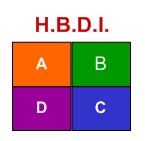BRAIN DOMINANCE QUESTIONNAIRE
This Brain Dominance questionnaire will give you an indication of your tendency to be a left-brain learner, a right-brain learner, or a bilateral learner (using both about equally).
DIRECTIONS: Answer the questions carefully, circling the letter for the answer that is most correct for you. Select the one that most closely represents your attitudes and behaviors.
I prefer to learn:
a) Details and specific facts.
b) From a general overview of things, and by looking at the whole picture.
c) Both ways about equally.
I prefer the jobs:
a) That consist of one task at a time, and I can complete it before beginning the next one.
b) In which I work on many things at once.
c) I like both kind of jobs equally.
I prefer to solve problems with:
a) Logic
b) My “gut feeling.”
c) Both logic and gut feelings.
I like my work to be:
a) Planned, so that I know exactly what to do.
b) Open with opportunities to change as I go along.
c) Both planned and open to change.
I like to learn a movement in sports or a dance step by:
a) Hearing an explanation and repeating the action or step mentally.
b) Watching and then trying to do it.
c) Watching and then talking about it while trying to imitate it.
I remember faces easily.
a) False
b) True
c) Sometimes
If I have to decide whether an issue is right or correct:
a) I decide on the basis of information.
b) I instinctively feel it is right or correct.
c) I tend to use a combination of both facts and instinct.
I prefer:
a) Multiple Choice Tests
b) Essay Tests
c) I like both kinds of tests equally.
If I had to assemble a bicycle or other piece of equipment, I would most likely:
a) Lay out all of the parts, count them, gather the necessary tools, and follow the directions.
b) Glance at the diagram and begin with whatever tools were there, sensing how the parts fit.
c) Recall past experiences in similar situations.
At school, I preferred:
a) Algebra
b) Geometry
c) I had no real preference of one over the other.
It is more exciting to:
a) Improve something.
b) Invent something.
c) Both are exciting to me.
I generally:
a) Use time to organize work and personal activities.
b) Have difficulty in pacing personal activities to time limits.
c) Am capable with pacing personal activities to time limits with ease.
Daydreaming is:
a) A waste of time.
b) A useful tool for planning my future.
c) Amusing and relaxing.
I can tell fairly accurately how much time has passed without looking at a clock.
a) True
b) False
c) Sometimes
When reading or studying, I usually:
a) Prefer total quiet.
b) Prefer music.
c) Listen to background music only when reading for enjoyment, not while studying.
SCORING INSTRUCTIONS
1. Count the number of “A’s” you circled: ________
Count the number of “B’s” you circled: ________
2. Solve the following equation:
-A + B = ______
INTERPRETING THE SCORE
-15 to -13 = Very strong left-brain dominance.
-12 to -9 = Left-brain dominance.
-8 to -5 = Moderate preference for left-brain.
-4 to -1 = Slight preference for left-brain.
0 = Whole brain dominance (bilateral).
+1 to +4 = Slight preference for right-brain.
+5 to +8 = Moderate preference for right-brain.
+9 to +12 = Right-brain dominance.
+13 to +15 = Very strong right-brain dominance.
| LEFT-BRAIN DOMINANCE | RIGHT-BRAIN DOMINANCE |
| Analytical – likes to look logically at details and facts | Global – like to process information as a whole |
| Linear, Sequential – low-intensity stimulus activates processing, dislikes excessive input | Random, Simultaneous – higher intensive stimulus activates processing, likes rich and varied input |
| Systematic – makes decisions by facts, gives objective judgments | Intuitive – makes decisions based on feelings, gives subjective judgments |
| “Planner” – prefers organizing before working on the task, remains “within the task” | “Corrector” – prefers adjustments during the task, can go “beyond the task” |
| Convergent – solves problems on the basis of available data | Divergent – solves problems through imagination and discovery |
Sources: Questionnaire: Author unknown. Revisions by E.C. Davis, English Teaching Forum, Vol. 32, No. 3; revised by Luciano Mariani, 1996.
Learning Styles Descriptions: Luciano Mariani, 1996.
Links

